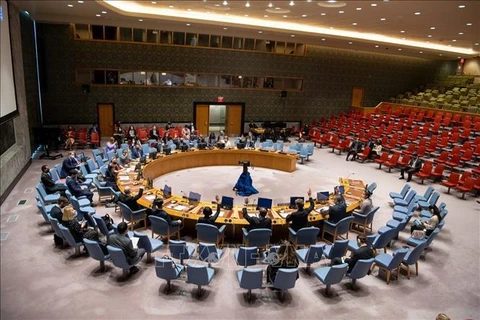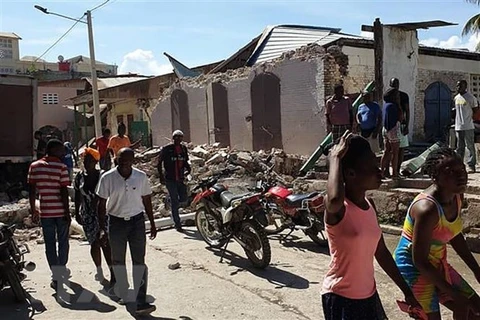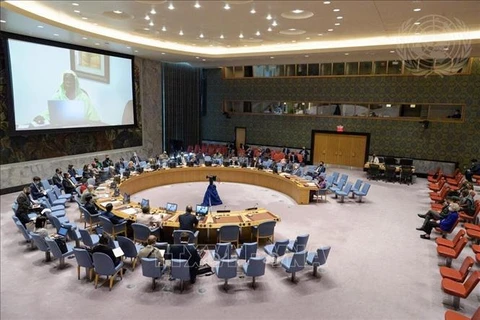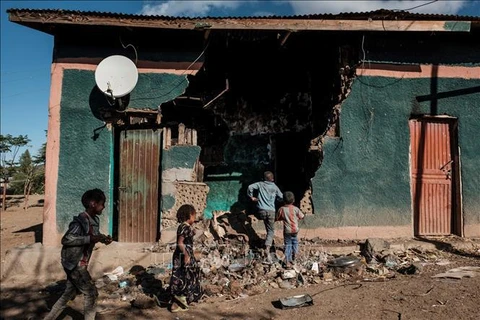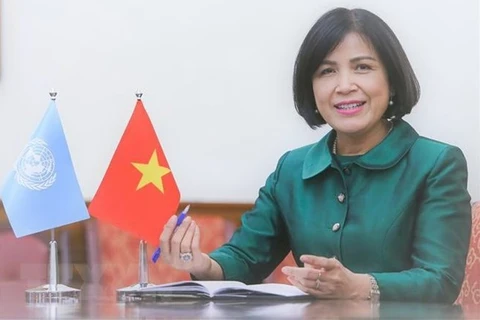New York (VNA) – Countries need to settle root causes of conflicts, including poverty, inequality and injustice, intolerance, discrimination, and incitement to violence, in order to build sustainable peace, said Ambassador Dang Dinh Quy, Permanent Representative of Vietnam to the United Nations (UN).
Addressing an open debate of the UN Security Council (UNSC) on diversity, state building and the search for peace chaired by Kenyan President Uhuru Kenyatta on October 12, the Vietnamese diplomat said that ensuring transparent and accountable governance, and promoting a culture of peace play an important role in this process.
Countries need short-term and long-term preventive strategies in terms of politics, diplomacy, humanitarian issue, development and institution, he said, adding that the UN and the international community need to support capacity-building to prevent conflicts.
In order to promote solidarity and narrow the gap between ethnic groups and religions, countries should take measures to promote consensus through dialogue and reconciliation with the participation of all relevant stakeholders, including women, young people, the elderly and vulnerable groups.
The development of laws, policies and mechanisms at all levels, especially at the local level, needs to be fully take into account the needs of all, Ambassador Quy said.
The Vietnamese diplomat also underlined mobilising resources for relevant countries, and suggested UN missions, UN groups at the national level, regional organisations and development partners need to further strengthen coordination in this work.
In this process, stakeholders should respect principles of non-interference in internal affairs, territorial integrity and political independence of countries, in accordance with the UN Charter and international law, and take into account the level of development, historical background and other particularities of each country, Quy said.
He affirmed that Vietnam always considers diversity as strength for its stability and development over different historical periods.
According to UN Secretary-General Antonio Gutteres, non-state armed groups and military coups are increasingly appearing around the globe.
Countries need to ensure that their national policies and laws prioritise the protection and promotion of human rights, regardless of race, age, sex, religion and gender identity, he stressed.
Gutteres suggested promoting unity through dialogue and respect for each other's differences, as well as ensuring the full and active participation of women and young people in the process of building and maintaining peace.
Participants shared experiences in setting up and taking advantage of early warning tools to respond to risks of conflict and violence, while proposing measures for the UNSC and UN agencies, regional organisations and development partners to assist relevant countries in the reduction of conflicts and settlement and post-conflict reconstruction./.
Addressing an open debate of the UN Security Council (UNSC) on diversity, state building and the search for peace chaired by Kenyan President Uhuru Kenyatta on October 12, the Vietnamese diplomat said that ensuring transparent and accountable governance, and promoting a culture of peace play an important role in this process.
Countries need short-term and long-term preventive strategies in terms of politics, diplomacy, humanitarian issue, development and institution, he said, adding that the UN and the international community need to support capacity-building to prevent conflicts.
In order to promote solidarity and narrow the gap between ethnic groups and religions, countries should take measures to promote consensus through dialogue and reconciliation with the participation of all relevant stakeholders, including women, young people, the elderly and vulnerable groups.
The development of laws, policies and mechanisms at all levels, especially at the local level, needs to be fully take into account the needs of all, Ambassador Quy said.
The Vietnamese diplomat also underlined mobilising resources for relevant countries, and suggested UN missions, UN groups at the national level, regional organisations and development partners need to further strengthen coordination in this work.
In this process, stakeholders should respect principles of non-interference in internal affairs, territorial integrity and political independence of countries, in accordance with the UN Charter and international law, and take into account the level of development, historical background and other particularities of each country, Quy said.
He affirmed that Vietnam always considers diversity as strength for its stability and development over different historical periods.
According to UN Secretary-General Antonio Gutteres, non-state armed groups and military coups are increasingly appearing around the globe.
Countries need to ensure that their national policies and laws prioritise the protection and promotion of human rights, regardless of race, age, sex, religion and gender identity, he stressed.
Gutteres suggested promoting unity through dialogue and respect for each other's differences, as well as ensuring the full and active participation of women and young people in the process of building and maintaining peace.
Participants shared experiences in setting up and taking advantage of early warning tools to respond to risks of conflict and violence, while proposing measures for the UNSC and UN agencies, regional organisations and development partners to assist relevant countries in the reduction of conflicts and settlement and post-conflict reconstruction./.
VNA

